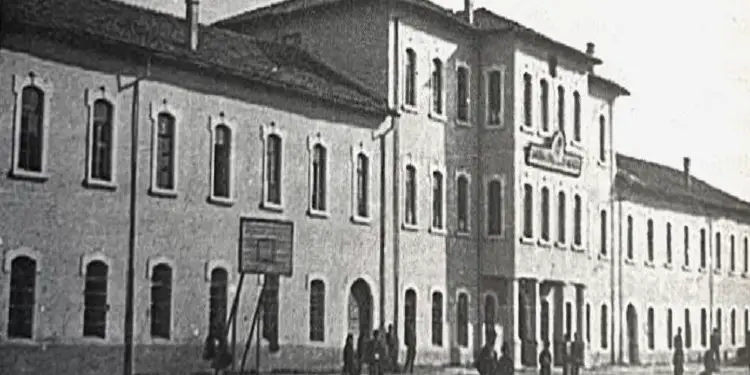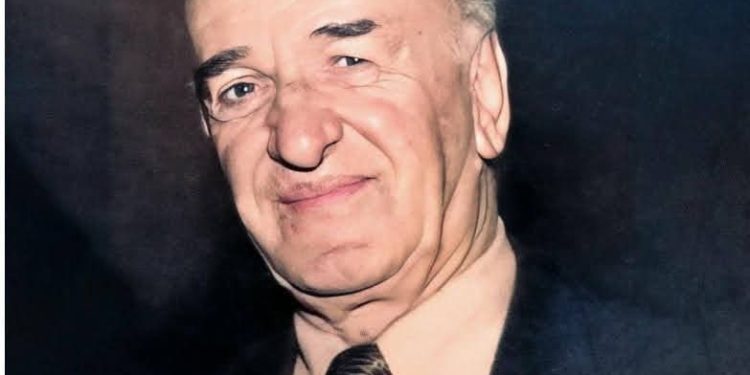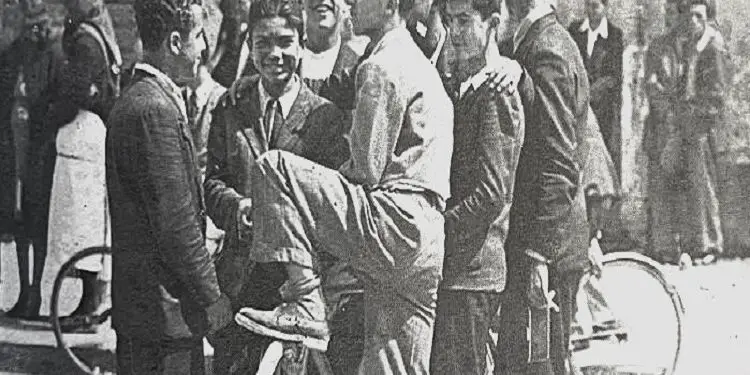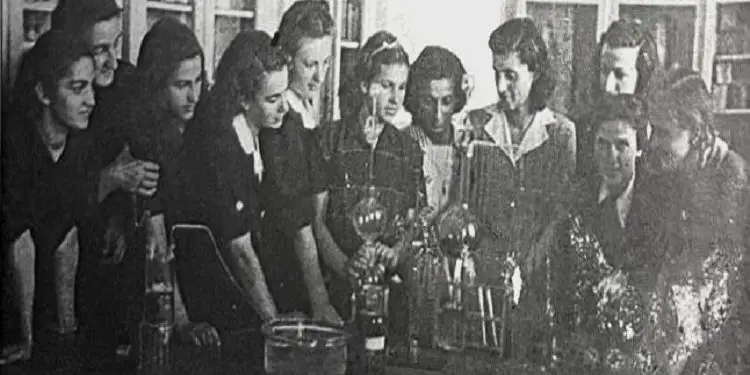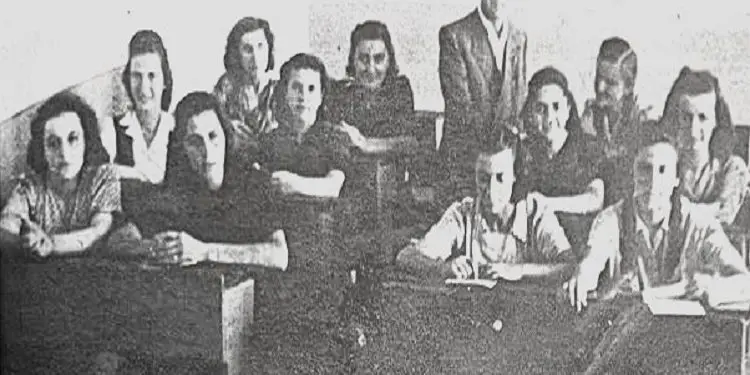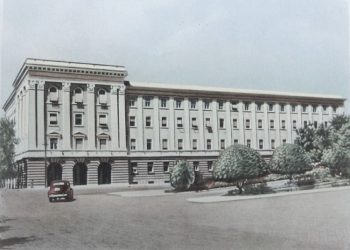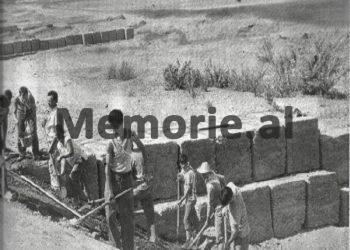By Ahmet Bushati
Part twenty-three
Memorie.al/After the flag was altered in 1944 with the addition of the communist star, Shkodra transformed into a center of resistance against the regime, paying a high price for its tradition of freedom. By April 1945, high school students, already feeling betrayed by the promises of the war, gathered to oppose the new terror that imprisoned and killed innocent people. Communism turned Kosovo into a province of Yugoslavia, while Shkodra was punished for its “historical crime”- its defiance against invaders. The “Postriba Movement” became a tool to suppress all dissent, plunging the city into an unprecedented spiral of suffering: imprisonments, executions, and the destruction of families. The high school students, alongside citizens, became symbols of resistance, while some “young communists” turned into tools of the State Security, leading to expulsions, imprisonments, and internments.
Four times, Shkodra rose in armed rebellion, but history forgot these battles. This book is written to remember the countless prisoners, the tortured, the killed, and the parents who suffered in silence. It is a warning against dictatorship and a plea for future generations not to forget the sacrifices made for freedom.
Continued from the previous issue
In the Footsteps of a Diary
Shkodra in the first years under communism
The Anti-Communist Movement of the Shkodra High School
The Anti-Communist Movement of the Shkodra High School did not exist in the form of an organization that included within its fold certain groups of students, who would occasionally come to that high school, during the years of their activity, and even less so that such groups had as their organizational basis the “former cells” of the communists of the War period. Consequently, given the conditions in which that movement developed, there was not even a single leadership, which should have belonged to another stage of development of their anti-communist activity.
The student movement of the Shkodra gymnasium would be characterized by the emergence from time to time of groups of anti-communist students, who would be activated independently and who would also use different forms of work in their activity, without excluding any case when they were linked among themselves or with other groups, such as that of the “Albanian Effort” organization, with the “Social Democrat” group of Mark Shllaku. What is important remains that these groups of students would have in common, their deep hatred for communism, their courage and the spirit of war, as well as, as per the tradition of that gymnasium, the continuity of their action from year to year and, group after group, following in the footsteps of their predecessor students?
Within the walls of the Shkodra Lyceum, during the short school year of 1945, the bright anti-communist movement that would last until 1952-53 would mark its beginnings, as a result of which about sixty students would be imprisoned, of whom over fifty would serve many years in prison, several dozen others would escape and become its martyrs; Bardhosh Dani, Mark Caca and Brahim Dërguti. In April 1945, the Lyceum would open its doors after two years of interruptions due to war. The Shkodra students, on that occasion, would see themselves once again gathered among them and united in their anti-communist stance, just as two or three years earlier, against the foreign occupier.
The betrayal of the ideals of freedom, independence and justice, promised with such eloquence during the War, as well as the unprecedented terror that was being exercised at that time on the people and the misery of life, the imprisonment and murder of many innocent people, the loss of Kosovo and the humiliating transformation of Albania into a vassal of Yugoslavia, had made the mirage of liberation quite ephemeral and the illusions of the war also very quickly turned into disappointment, anger and revolt, involving almost the entire high school. The number of students, who had remained “communists” since the war, or “young communists”, had been reduced to more than symbolic figures.
During this first school year after the War, together with Xhevat Qukun, we thought about an anti-communist movement within the high school. More or less at that time, and with the same thought, another friend of mine, two grades above me, Burhan Hoti, would approach me, who, after talking about the need to create an anti-communist movement in the high school with reliable students, would tell me that it had been thought that for the two fifth grades, I would be the key link in a common chain, just as he himself would be for the seventh grade, and Faik Luli for the sixth. Burhan Hoti and Xhevat Quku were two of my closest friends, friends among themselves, but not as close to each other as each of them was to me. The experience from the last war taught us to be very careful and conspiratorial in our newly begun work, so much so that I had not told Burhan what we were specifically planning with Xhevat, just as I had not told Xhevat about the connection with Burhan.
So, from the beginning they had in mind that two parallel lines would operate in the high school, connected to each other, despite the differences they would have between them, so that while our two 5th classes would be very homogeneous and explosive, Burhan’s 7th and, more or less, also the 6th, within which Faik Luli would operate, would consist of propaganda only within a limited number of students, very reliable, and this because in the composition of their classes, there were students who led the politics of the government in the school, as well as others who, as they were more closely related to the War, would, for the sake of opportunity, act as if they supported the line of government, while another last part of them, who, although they should think like us, would remain hunched over in passivity, waiting to get a job after graduating in a year or two help the family, or for themselves a scholarship abroad.
Finally, important in this case would be the fact that in the high school it was initially believed that two lines were starting their lives, like two daughters of one mother, who would complement each other, as one thing that was in will and purpose. Together with Xhevat we would discuss constantly and spend some nights without closing our eyes, devising plans and forms of work, as well as analyzing name by name a number of students who should be included among the first within our movement. The conspiracy was thought to be at the foundation of our work.
We also thought that as long as the Anglo-American factor – on which we had pinned our hopes – had not materialized in our support, that is, in support of the Albanian resistance in general, we would continue to keep alive, among others, the spirit of revolt, for the overthrow of the communist regime, organizing for this purpose a small nucleus for each class, which at the right moment would explode like detonators inside and outside the high school. Every other activity of ours until then should give the impression of spontaneity and as not inspired, much less directed, by specific people.
Our two V classes, – which some of our friends from the higher classes would call “fiery”, within a short time would be solidary and enthusiastic among themselves, in all the first reactions that would be undertaken. First of all, we had close friends with whom we were close, such as; Faik Kazazi, Nexhmi Bushati, Remzi Quku, Abdulla Miloti, and then our old and new friends, such as; Hodo Sokol, Asime Pipa, Gjon Kovaçi, Injac Serreqi, Ramadan Ahmeti, Njazi Barbullushi, to always continue with our best friends, such as; Asim Dani, Xhelal Boksi, Petrit Garuci, Qazim Borshi, Zyhdi Kraje, Lin Gjeka, Kastriot Bajraktari, Lec Grude, Lekë Dajë, Injac Derragjati, Musa Karini, and, in general, the other students of our two fifth grades, who, despite not having the first place, would constantly support us, such as; Jakë Dedi, Rrok Nenshati, Sandër Laca, Kadri Kali, Bik Prendushi, Syrri Myrtja, Fadil Kraja, etc.
In solidarity with us in all cases would be many of the students of the 4th grade who came below us, led by Viktor Kujxhina, Çesk Hilgega, Angjelin Nenshati, Xhevat Gjyrezina, Ana Daje, Neta Zojzi, Emil Prendushi, Luan Borshi, Çita Simoni and some others, with whom we were indirectly connected through Remzi Quku, who was in the same class as them.
I feel obliged to mention here the name of Muharrem Dragovoja, a close friend of mine, who, if he had not wanted to expose himself to others due to his special circumstances, would have confided his hatred of communism only to me. He had been very young when, together with his father, they had gone out with partisans in the Tropoja area, something that the communists of the high school did not know and did not want them to know. “If they find out that I was a partisan, they will call me to organize me as a communist, who would put me in a difficult position,” he had told me several times.
Before the end of the first school year after the War, in the 4th grade, a political incident would occur that would reverberate throughout the high school: some young communists from the upper grades of the high school were delegated to this class by the B.R.A.S. (Albanian Antifascist Youth Union), who sought the consent of this class to send a telegram to their class in the Prizren high school, through which this class wanted to express solidarity with the policy of the Albanian government of Enver Hoxha, regarding Kosovo being included within the socialist and fraternal Yugoslav state. The delegates’ debates with the class had generally continued for a long time and, towards the end, had become very heated.
Finally, this class had not accepted to make a telegram and, to the insistence of the delegates, Remzi Quku had responded: “You who are communists, make a telegram in your name, while we, we do not accept to make a telegram of deception for our Kosovar brothers”! The next day, when the students were going to the high school, they saw how the “wall newspaper”, in a special issue of it, had hurriedly brought out an article with the sensational title and in large letters: “I am not a communist, declares Remzi Quku”!
In one of the meetings that the B.R.A.SH together with the delegates from the Party committee – still unannounced – organized with us students, one of the main speakers who was talking about the Yugoslav right over the Italian Fiume, Burhan Hoti, taking the above as an excuse, would ask the question: – “Why don’t we also ask for Kosovo, like Yugoslavia asked for Fiume”?!
Since the liberation, patriotic songs were not allowed to be sung anymore!
It had been a year since those songs had passed into “heresy”, for their alleged reactionary character they were shown, considering their authors, like Fishta and his friends, as disturbing lights that were for that power, they had to be extinguished. We, in open defiance of the instructions of the Ministry of Education and the Directorate, and generally with the line of the Government, had decided to sing those songs in the presence of the people, on the occasion of the feast of 28th of November 1945, a day that since that government was considered only as the vigil of the feast of 29th of November.
On the evening of 28th of November, the square of Shkodra was decorated like never before, with numerous flags and banners with red backgrounds, which a light and slightly cold wind, as if caressing, was constantly waving. Lights placed in various places had brightly illuminated the small square of the square, as well as the road leading to the Municipality. Powerful loudspeakers, hung from tree branches along the side of the road, broadcast in high tones the sounds of partisan marches, which were occasionally interrupted by the energetic intervention of an announcer, who in a baritone voice spoke briefly about the importance of the next day, that of liberation.
On the sidewalks of the piazza there were people, who, as on every evening, continued to walk quietly, according to their usual ritual. At the time when the parade of students according to classes would begin and when, in turn, our two classes would turn to the center of the square, to continue the route in front of the cafes “Adriatik” and “Kafe e Madhe”, we, as we had decided earlier and contrary to the instructions of the directorate to sing only partisan songs, as well as to cheer for the day of liberation, Enver Hoxha and Tito, broke the lines in a hurry and started singing; “Like the leaf of God’s arrow, the flag of Albania is waving”!
Soon many of the students from the 4th grade and some from the higher grades came and joined us, among whom I still remember Fuat Zajmi, who that year was one grade above us, and who on that occasion had put his hand on my shoulder and, singing in a loud voice, had brought his mouth close to mine. Especially on the way in front of the two cafes, many people had stopped, observing us as if with surprise and sympathy, which was shown by their excited looks on their faces. Meanwhile, we had slowed down our walk a lot and continued to sing one national song after another, feeling proud of what we were doing.
To properly understand the importance and courage shown by a number of students on that occasion, as well as the effect that such a manifestation had on the people present, we must return to that time, to its circumstances of terror and fear, so that such an open demonstration as an opponent can be assessed as an action and as a real challenge to the communist regime. This was the beginning. Patriotic songs, as a sign of opposition to the regime, we would sing them throughout that school year, whenever we went out for volunteer work, for school outings, etc. We had sung patriotic songs since we were little, in school and back, during demonstrations against the occupiers alongside our elders and, as we have shown; we would continue to sing them even in communist prisons.
Regarding the great effect that the verses of such songs must have had among us citizens, especially for some of us who had helped the war, it can be said without much modesty that we came to that high school, as ripe as they were before their time, even as a child for our age. It must also be said that we were very correct and loyal, both in relation to our anti-communist cause, and in our attitude towards our comrades. As an illustration of the above, I am telling a personal story, precisely from that time: I was included in the group of forty athletes, who on the occasion of the first anniversary of the Liberation, after running 3 kilometers each in relay form, would join the group in the newly built “Qemal Stafa” stadium, where we would symbolically hand over to Enver Hoxha the key to the Shkodra fortress.
A visit to Tirana – where I had never been – greatly attracted the sixteen-year-old me, but nevertheless, I would refuse to participate, because the inadmissibility of the act was stronger than the encouragement of Tirana, considering that Enver Hoxha did not deserve such an honor, from Shkodra.
Also, two years later, in 1947, I was included in the basketball team that would represent Shkodra in the national championship, which that year was held in Durrës, with a round robin system. With the greatest regret for Professor Menduh Agolli, who loved me so much and, on that occasion, begged me not to miss it for any reason, however, regardless of the regret for Prof. Agoll, I refused, because politics had decided that at least two of my friends, who deserved to participate, would not be included in the group, while two others, undeservedly, would participate in its composition.
Starting from this time, the continuous pursuit by the Sigurimi would begin, which for that purpose would engage, in addition to its regular employees, also a limited number of students, to control all our movements, although that wonderful school year, in any case, would remain as if occupied by the anti-communist spirit of the overwhelming majority of students. Coinciding with our “movement”, the number of escapees had increased among the mountains and, in Dukagjin, they numbered in the hundreds.
Somewhere in the second semester of the 1945-46 school year, the private schools of the “Fretën” and “Jezuitëv” were closed. The arrival of their students at our high school would give rise to the hope that some of them might approach us. The truth was that, not knowing us, they had initially shown distrust towards us and we had the impression that they were talking to each other face to face, for fear of not being heard by us. The days that passed became their own, and later, starting with Ernest Perdoda, Pashko Luka, Kel Vuka, etc., they began to approach and join us. Throughout that school year, especially in our two fifth-grade classes, a burning and very enthusiastic spirit of patriotism would reign.
The spirit of rebellion would become very contagious. It was started by a considerable mass of students, who, so to speak, had declared themselves opponents of communism and its power, as well as by the silent solidarity of the other part, somewhat more reserved and prudent in its stance, but still opponents of the regime, that it sometimes occurred to them that the entire high school was involved in an unorganized anti-communist organization. During this period, we were a group of friends who played basketball in the school yard every afternoon, and regularly at the end of each game, we would start singing the national anthem, while there were students who had been standing around the field since before, waiting for us to finish the game, to hear us sing those songs, which were as beloved to them as they were to us.
Meanwhile, as we have already mentioned, in front of us would stand a small group of communists, or young communists, opponents of us, who had severed social ties with most of their classmates of several years. Our impression was that they, huddled and closed within a small society and comforted only by the support they enjoyed from the government, as well as by the idea that one day they would benefit from scholarships to study abroad, for the rest, – always according to us – they were patiently enduring unpleasant school days. Despised and isolated by the majority of students, they gave the impression that they carried within themselves the mystery of a number of dangers for others, especially for us, open opponents of the government they defended.
But for them to take power over that high school, they would have to be patient and wait for another school year, that of 1946-47, when that school would no longer be called a high school, but a gymnasium, and when the dictatorship, somewhat silently impregnated during the year we are still talking about, would burst forth uncontrollably to fight mercilessly and with terror against everything that came its way, in and outside the high school. But until then, they needed some time and the high school continued to roar like a volcano. In such a state of the high school, the “Security” and the “Government” in the country had been greatly concerned, and the surveillance of us by means of some students we had put at their service had increased significantly.
This serious situation had caused the communists of the high school to meet urgently one day, together with those sent by the still undeclared Party, as well as by the Youth Organization, who, analyzing the situation in the high school, had characterized it as “dramatic” and fraught with the danger of a revival of “reaction”. At the end of the meeting, they had assigned specific tasks to each communist and also decided that on the third floor of the high school, several long rifles would be locked up to be used in case of need. The introduction of weapons into the school, was confirmed to me by the cleaning worker, Nikë Daka. At that meeting, it was decided that even the wall newspaper, torn several times by anonymous students, would be kept at a distance from them. At this very time, they would write an article in that “wall newspaper” in which they would describe the opposing students as “reactionary” and “fascist”, which would greatly infuriate us. Memorie.al




